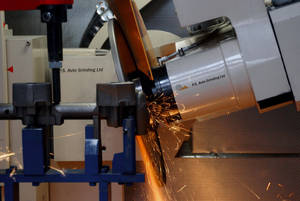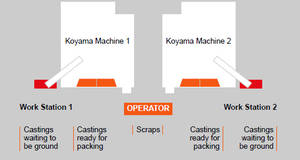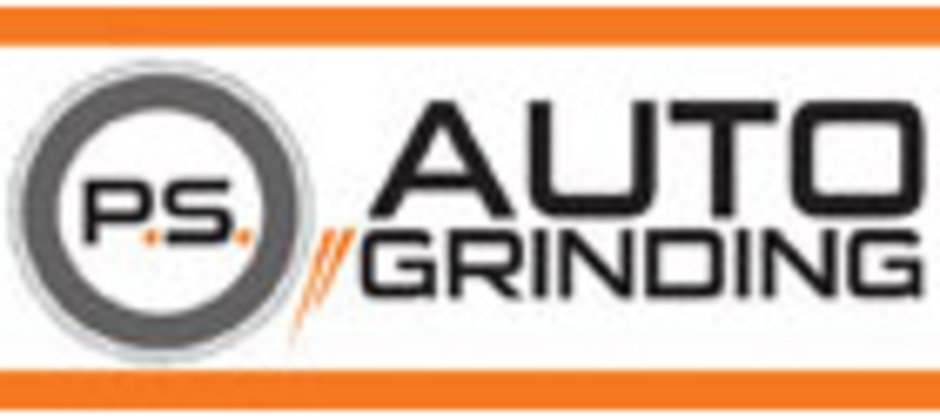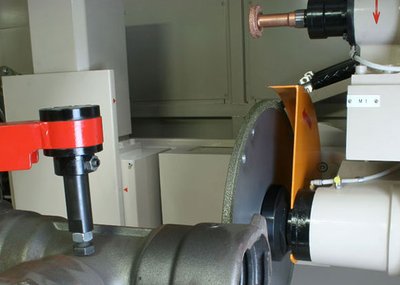Repetitive Grinding Operation |
Not only can automatic grinding machines improve the consistency of the finish of castings processed in fettling departments but the health and safety of foundry employees is also improved significantly, suggests PS Auto Grinding.
It is surprising how many foundries in the UK still consider practices and processes such as manual grinding of castings as being cost-effective, offering excellent quality and repeatability, as well as being an acceptable means of employment.
Of course, there is legislation from the European Union with us since 2005 covering the biggest area of concern, namely HAVS, or 'vibration white finger' as its known, a condition that is acted upon rigorously by the Health and Safety Departments of government. Regardless of legislation and the possibility of being forced to do something, however, is it good business and morally correct in 2012 to ask people to do a job that, probably, managers and business leaders would not want to do themselves?
A colleague at PS Auto Grinding recently decided it was time to replace a concrete patio area with decorative blockwork. Being Scottish and fairly practical, he decided to do the job himself and hired a large breaker. After the first hour, according to Bob, his hands started to become sore with the vibration from the machine. Having completed the task six hours later, he swore never to tackle a job like that again! It took so long because his hands were becoming increasingly sore and as the pain became worse, he slowed down. Unlike a grinder in a foundry, however, Bob does not have to start again the next morning for a full shift and every other day thereafter.
 Health and Safety Executive Vibration case study. |
Going back to the foundry, the issue of vibration - particularly in the fettling department - has been addressed in part by the following measures:
- Buying lower vibration grinders.
- Putting safe work systems in place.
- Rotating workers to reduce exposure to vibration, dust, noise, sparks etc.
- Health monitoring.
- Very strong, robust and expensive management controls
However, the following factors cannot be addressed:
- The high numbers of grinding staff required to accommodate the fast turnover of fettlers in some foundries. People will not stay if there is an easier alternative
- A hand grinder cannot repeat, with any degree of consistency, a finish to any usable tolerance without substantially slowing down.
- The ability to realise significantly more production per day from a grinder.
- Most importantly.... it is now considered a terrible job rather than being a really terrible job!
 PSAG machine in operation. Operator is protected from all risks of accident or vibration. |
Are foundries missing the point?
Here, the Work Prevention Department, aka the HSE in the UK, is open about its guidance. Shown below is an extract taken recently from the HSE website, discussing alternative processes to avoid/reduce the use of vibrating equipment:
Of course foundries are making great strides to reduce fully or partially the amount of grinding that is required, if any. When fettling cannot be avoided is there a way that completing the process without the use of vibratory tools that is reasonably practicable and affordable?
'Substitute alternatives to manual fettling using, for example:
- Robot fettling machines.
- Automated grinding and manipulators.
- Semi-automatic cut off.
- Cropping machines.
- Jig-mounting for grinder or castings.
Design of casting and runner systems should allow for these methods.
Note: These methods for elimination and substitution will usually be reasonably practicable for large production runs; some may also be appropriate in jobbing foundries.'
Avoid hand grinding rather than making a bad process less bad
Automatic grinding machines such as those available from PS Auto Grinding not only address problems in the fettling department but also actually eliminate the problem. A typical exposure comparison by an HSE case study shows that vibration exposure is now nil, using automatic grinding machines requiring little or no management of vibration and other risks associated with fettling.
Furthermore, the following issues are also answered:
- Faster: Two-three times faster and one operator can work up to three machines in a lean cell.
- Much improved performance: Mechanical accuracy and repeatability is 0.1mm for light flash, up to 0.3mm for heavy flash. Allied to PS Auto Grinding's 'no wear' diamond technology, where the wear on the diamond wheel is negligible, with no wear compensation required, this guarantees 100% consistency from the first casting to the last.
- Much safer: Grinding in an automatic grinding machine is fully enclosed so not only is vibration virtually eliminated (other than some manual deburring occasionally) but eye accidents, cuts, grinding dust and noise are dealt with as well.
 Lean cell configuration: Up to six times faster than manual grinding, with 100% repeatability. |
Established, cost-effective technology
Developed in 1973 by Koyama Corp, a foundry in Japan, there are now 2000 installations worldwide. In Europe, there are machines in 16 countries, including the UK, grinding over 50 million parts per year and growing.
This equipment was designed to be programmed by hand grinders with no previous programming experience or qualifications. An average programme takes between one and three hours to complete. Fixtures to hold the castings are inexpensive, even made from resin in some cases, in addition to which they are fast to make.
Due to the speed of the machine and its accuracy versus manual methods, the payback time is rarely more than two years, often faster, without factoring in the elimination of grinding rejects, greatly reduced inspection requirements and reduced management input to the department. For example, Castings plc of Brownhills, UK has 37 machines working three shifts per day, seven days a week. These machines are now 11 year old and are working at greater than 98% uptime.
No longer viable
Hand grinding is no longer a viable option in 2012. Of course, as a market leader, PS Auto Grinding would claim this, as would every manufacturer of automated or semi-automated grinding systems.
The evidence is clear, however. Automatic grinding machines are much cheaper than conventional hand grinding, producing more with fewer people, the quality and repeatability improvements are considerable and working conditions are much better, with a major and potentially expensive problem of 'vibration white finger' avoided or minimised.
PSAG machines are the first in the market with an Automatic Grinding Machine to be just as suitable for short and medium size production runs as they are for long production runs. This brings all the benefits of automation to all types of foundries needing to change production often to meet the demand for smaller batches.
Some foundries are coming to these conclusions for themselves, while others will be brought to them more quickly as a consequence of legislation. Eventually, customers may demand that their castings are produced in the cheapest way possible and with the highest quality, using a process that does not put the health and safety of workers at risk.
Competitive (dis)advantage
Increasingly, castings buyers want components that fit first time, every time and are consistent one batch to another. They also want these items to be produced in the most cost-effective manner, as well as being made efficiently and safely, often in small batches or just in time(JIT).
Foundries cannot afford to offer inconsistently fettled castings, with either a higher price or lower margin to the foundry than their competitors. What foundry can also afford to have the Government Health and Safety rigorously enforcing EU Vibration Directive 2002/44/EC and the subsequent Civil claims from grinders? What foundry in 2012 can afford to be at a competitive disadvantage?
| P.S. Auto Grinding Ltd. is a leading supplier. For further information and contact details click here: P.S. Auto Grinding Ltd. |



